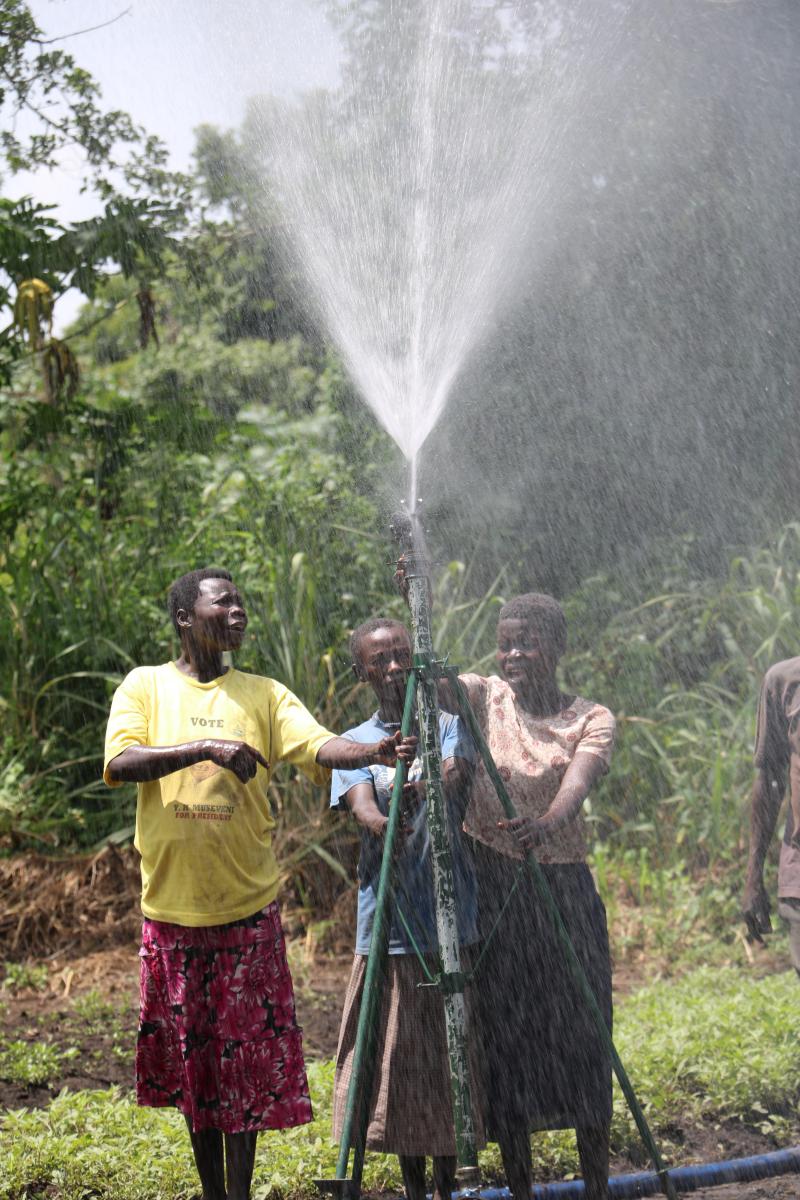Farmer group irrigates community to life
Walking
through the Rhino Camp refugee settlement in Arua district, one encounters
gardens with withered crops, bent against the scorching heat of the midday sun.
The rains have taken long to come, and farmers have borne the brunt.
However, in
the midst of this lies a patch of land that looks out of this withered world.
Vegetables of different shades of green sprout from the dark rich soil, whose
softness and moistness make them seem misplaced in their surroundings.
Looking
at it, the term ‘oasis’ springs to mind.
Thirty-nine
year-old Charles Alindu is busy watering the vegetables.
“The weather
patterns have become very unpredictable these days. July to August used to be
the rainy season, but not anymore. We planted our crops in July, expecting rain
but it rained only thrice the whole month,” he explains.
Alindu is
the chairperson of Nyazu Farmers’ Group. Formed in January 2018 by the
organization Community Empowerment for Rural Development (CEFORD), the group has
25 men and women interested in carrying out agriculture.
Together,
they have invested effort and time into growing vegetables that include cowpeas,
eggplant, amaranthus, okra and jute mallow. These are not only highly
nutritious, enabling them to change their families’ diets, but also on demand
in the community, something that enables the group earn an income.
And it is through
working together as a group that they are able to do better than many other
farmers in the area. Funded through the European Union Trust Fund for Africa’s
Support Programme for Refugee Settlements in Northern Uganda, CEFORD has formed
55 groups that it is working with in a bid to enable them achieve home-based
food security and income.
CEFORD
trains the group members on modern and better agricultural methods as well as
business development and enterprise
selection. It is through training that the group was introduced to irrigation.
“This river,
River Enyau, has always been here, but we had never used its water in our
gardens on a large scale. We tried watering with jerrycans and watering cans
but it is quite tasking since they can only hold small volumes of water,” says
Alindu. “Instead, during the dry season we would go and plant our vegetables
along the river bank, but they were congested and did not grow well.”
Indeed,
Godwin Amege, Project Officer with CEFORD, says the river bank was always
crowded with patches of vegetables, which congestion affected their growth as
the river is frequented by many people from the community who take water for
home use.
After
training, Nyazu Farmers’ Group presented a business plan to CEFORD, which
bought them a sprinkler irrigation system and taught them how to use it.
“This is
precisely why I joined this group,” says Alindu, “to gain new knowledge and
skills that would enable me change from a farmer who only produces food for
eating at home to one who produces to also earn an income.”
The group is
gradually becoming self-reliant, being able to run the irrigation pump
themselves three months after receiving it from CEFORD. Using the UGX552,000
they earned from the sale of their first harvest, they buy the petrol that powers
the pump instead of depending on CEFORD. The challenge, however, comes when the
pump breaks down as none of the members has the technical skill needed to fix
it. CEFORD hopes to solve this through training.
From their
first harvest proceeds, the group has also cleared four acres of land where
they will grow cassava. And in this they have applied knowledge from the
trainings they received, first carrying out a cost-benefit analysis, studying
the cost of production first before committing to production. The next plan is
for the group to start a village savings and loans association, where each
member will be able to save some money for a given number of months before
being able to take a loan at a low interest rate.
The cassava
project will expose them to an even newer innovation, channel irrigation.
“Because of
the size of the land, the cassava garden cannot be watered with a sprinkler.
Instead, we will use channel irrigation,” says Amege. With channel irrigation,
the river is blocked for a while, allowing it to take a predetermined route and
therefore flow into the channels that have been dug, finding its way to the
crops.
Twenty-eight-year
old Monica Draleru, a mother of four, is sure she did not make a mistake
joining the group. “It has improved my life,” she says. “Money that I would
have used for buying food now goes to meet other needs, such as school fees.”
The group is
helping not only her community but also the South Sudanese refugees living
within. Because they do not have money to buy food, refugees use barter trade
to get vegetables from Nyazu Farmers’ Group in exchange for some of the food
ration they get from the World Food Programme. This way they, too, are able to
change their diets.
Just like
the programme’s objective, the group’s activities are increasing the long-term
availability of food for their families and community (food security), filling
stomachs, wallets and lives.
Dernières actualité de ce projet
Pas d'actualité

